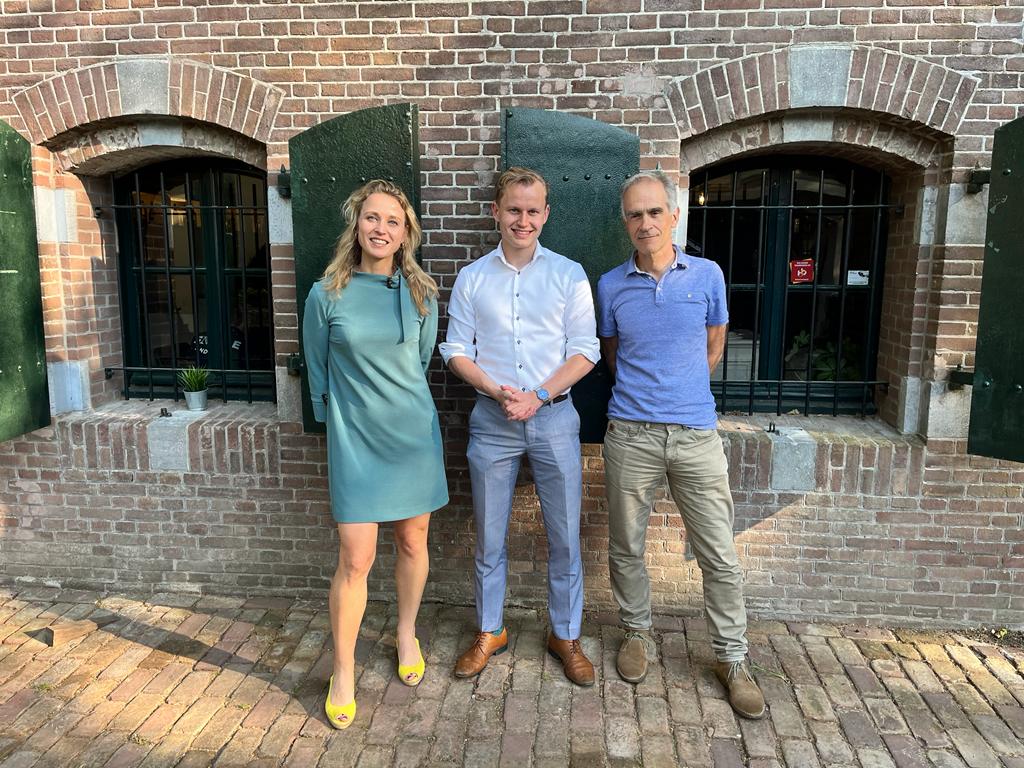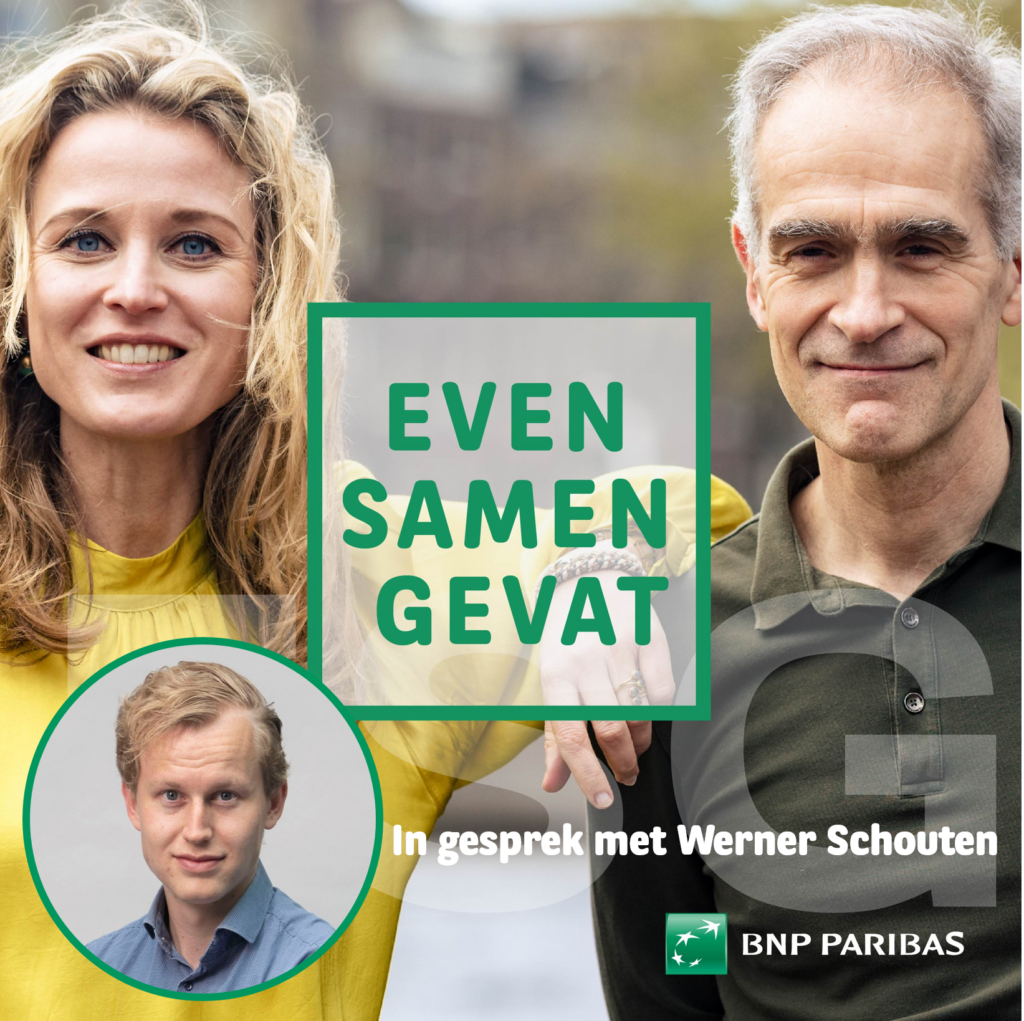Werner Schouten was one of the speakers at a personal finance event held by BNP Paribas in June. Afterwards, Marloes and Aldert spoke with him for episode 26 of ESG (Even Samen Gevat).
Werner Schouten is the director of the Impact Economy Foundation, member of several advisory councils and one of the two presenters of the BNR Koplopers podcast. He was also the chairman of The Young Climate Movement (De Jonge Klimaatbeweging) – yep, Werner is young – in which capacity he joined in the talks on the Dutch climate agreement. But he and his colleagues didn’t stick around there for long. ‘The agreement was a voluntary and noncommittal affair’, and he wondered ‘whether there was really any point in talking to the turkey about Christmas dinner.’ The business community (the turkey) took part in the talks, which is one of the reasons that there weren’t enough firm commitments. That’s not Werner’s kind of thing. He’s a man of action, as we soon found out.
Clear frameworks
A couple of years ago, Dutch Minister of Economic Affairs and Climate Policy Wiebes spoke of the ‘tonne hunt’. He argued in favour of finding as much greenhouse gas as possible for the lowest possible price. That’s not enough, according to Werner: ‘We want to go for the Paris climate agreement, and that means we want to see at least a 55% reduction in emissions. One way is by pricing carbon so we know for certain that we’ll achieve that goal.’ In his view, that needs to be a political initiative. The government needs to establish a clear framework so that it can sit down with businesses to discuss how to achieve those goals.
True prices
Werner says another way to do that is with true pricing – which is not even mentioned in the Dutch climate agreement. ‘A true price gives an honest impression of the actual social costs of a product. If you include those in your calculation, you’ll encourage the market to be innovative.’ But it’s about more than just true pricing. It’s also about things like a redistribution of capital, ‘because we’re currently living on an unasked-for subsidy from people in emerging economies. They often don’t earn enough to live on, or children have to help out by working on the farm. It’s fundamentally wrong that we actually keep people there in poverty for the sake of lower prices in the Netherlands and that they’re also the first to be hit by climate change and have to pay the bill for it.’ True pricing is especially a matter of human rights, and that’s what the Impact Economy Foundation is committed to.
Monetising the impact
The Impact Economy Foundation wants to create a fair world with ‘an economy where our decisions are driven by making an impact so that, ultimately, being a sustainable, responsible and honest business is simply more profitable and easier than doing business as usual.’ Werner calls that an ‘impact economy’. Getting there takes a different approach: ‘If we want to take sustainability seriously, we also need to factor things like the climate and biodiversity into our bottom line and look at their broad impact on society. So it’s not only the financial value but also the social, human and natural value that we create.’ Werner says that we should then ‘monetise’ those values and that impact: make them measurable, quantify them and express them in euros. ‘That makes it easier to compare and to come to a rational decision on the basis of your impact.’ That’s how you as an organisation can price human rights and the damage that you cause in that respect.
Positive developments
There are already some positive developments in that direction. Werner mentions ventures like network managers Liander and Stedin and water company Vitens, which already have their own social financial statements. There’s also the Banking for Impact coalition, where banks like ABN-Amro, Danske Bank and the Spanish Caixa Bank have committed themselves to a more inclusive market economy and look at more than just shareholder value.
In addition, the European Union seeks to use its economic power ‘to ensure that companies account for their impact’ on their books. And that’s a must, because ‘Europe is where it needs to happen if we as an economic power block want to get other countries on board’, says Werner. In that connection, he mentions the Corporate Sustainability Reporting Directive, which aims to ensure that companies are transparent about their impact, the Corporate Sustainability Due Diligence Directive, ‘which says you need to conduct due diligence so that human rights violations occur less and less frequently’ and the Carbon Border Agreement Mechanism, the carbon border tax on products entering the European Union, such as steel imported from China. Chinese steel companies will soon just have to pay for emissions rights for the steel that they export to Europe.

Sense of justice
Werner realises that he ‘won the jackpot’ by just happening to be born in the Netherlands. ‘For so long, I thought this kind of prosperity was completely normal. Until you see the other side and realise that such prosperity also comes at the expense of many, many people in emerging economies and of the wellbeing of future generations.’ His sense of justice tells him that he should not ruin the chances of others to have a good life too. ‘It’s not the footprint of the people who earn just above minimum wage that you should look at, because they usually already live quite efficiently. It’s mainly the well-do-to people in the Netherlands with their two cars, their big house and their holidays by air that have a huge impact. So they also have the greatest task.’ But in Werner’s view, it’s exactly those people with the higher incomes that do not set the right example and who actually receive the most subsidies. ‘That’s extremely demotivating’ for the less fortunate.
From growing to flourishing
‘But if we really want to stay within the planetary boundaries, we’ll need a certain economic decoupling.’ We’ll have to set limits for economic growth in order ‘to prevent economic collapse’. Werner doesn’t believe in green growth either: ‘We have never seen green growth, and nowhere has it been scientifically proven.’ That means we’ll need to work towards a post-growth society. If we don’t do that, we’ll end up with ‘a much more abrupt, ugly, destabilising form of degrowth’ such as because there is no longer enough water or because the rare earth metals needed for growth have been used up.
That’s why Werner believes we need to go from growing to flourishing. To putting wellbeing and quality of life first: social cohesion, human capital, the health of our people in society, natural capital, resilient ecosystems and good biodiversity. That’s also one of the aims of our economy, but it’s currently tied to financial growth. What you ultimately want is for broad-based prosperity to be at the heart of things.’ And who knows, maybe someday Werner will even become our government’s minister of broad-based prosperity. But for now he wants to ‘try to build a movement’ with his Impact Economy Foundation: an impact economy movement. He calls that ‘building on a new narrative for the economy’. ‘And that gives me a gleam of hope every day, again and again.’
ESG Even Samen Gevat is a podcast series (in Dutch) in which Aldert Veldhuisen and Marloes Bergevoet talk to accelerators of the sustainable transition. They discuss topics related to the “E”, like green energy, CO2 emissions, raw materials, biodiversity, the “S” of health, diversity and inclusiveness and the “G” such as laws and regulations and international cooperation.
Also published in this series are:
- The energy transition in 10 dilemmas – with Roy op het Veld
- Circular farming in the city – with Minke and Peter van Wingerden
- De energy transition is also geopolitics – with Rob de Wijk
Follow Even Samen Gevat here so you don’t miss an episode!
